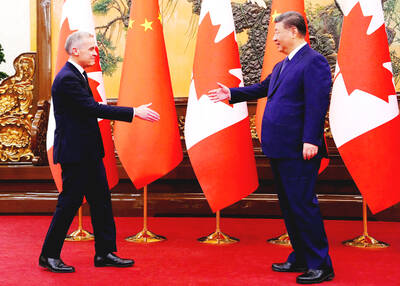In the heart of Taipei at Legacy — a venue renowned for hosting diverse musical acts — Alvvays, a Grammy-nominated ensemble from Canada, delivered a compelling performance last week. With a fusion of indie-dream pop and shoegaze influences, Alvvays enthralled the audience with their catchy, introspective melodies and refined stage presence.
Legacy, brimming with subdued anticipation, served as the ideal setting for Alvvays’ show. Almost reaching its full capacity, the venue buzzed with excitement as the band took the stage. Off Time Production, the local organizers, infused a unique touch by having a hipster pizzeria, Under The Bridge, cater the event. Offering tantalizing NT$100 slices alongside obscure IPAs and Taihu branded beer, their offerings sold out swiftly, adding a distinct flavor to the night.
Alvvays commenced their set with an anthemic rendition of Pharmacist, establishing the mood for an immersive evening. The band’s stage presence blended soothing, delectable, and occasionally ambitious elements especially from guitarist Alec O’Hanley. However, initial bright stage lighting obscured the projected visuals, prompting lead singer Molly Rankin to request dimmer lights for a more enigmatic ambiance.

Photo: Steven Vigar
“It’s a bit hot up here. Can we turn down the lights? We need to create a bit more mystery,” she said during a break between songs.
As the lighting dimmed, the atmosphere shifted seamlessly with their next song, Belinda Says, aligning perfectly with the band’s ethereal tunes.
Interactions with the audience were brief but impactful. Molly’s acknowledgment of this being the band’s inaugural visit to Taiwan garnered the loudest cheers, demonstrating the audience’s familiarity with the band’s journey.

Photo: Steven Vigar
“But it sounds like you know that!” she playfully responded.
Alvvays’ performance replicated their recorded tracks meticulously, highlighting their seasoned expertise and tireless dedication. Each song showcased the band’s exceptional musicianship, resonating magnetically with the crowd.
While maintaining their signature sound, Alvvays surprised the audience by accepting requests for their encore. The crowd eagerly shouted their favorite tracks, culminating in a thrilling rendition of Next of Kin, further solidifying the audience’s connection with the band.
However, the audience’s demeanor was unique compared to Western concert-goers. Reflecting the band’s style, attendees swayed politely, mirroring the dreamy melodies with a thoughtful yet subdued engagement. Molly charmingly acknowledged these differences in Taiwanese audience interaction, a touch that resonated well.
“You guys can get louder, you know! We are used to loud, rowdy North American crowds,” she quipped.
This brief interaction momentarily elevated the crowd’s engagement, enhancing the intimate atmosphere.
Alvvays’ performance in Taipei was a serene journey, enveloping the audience in captivating melodies and refined stage presence. The concert showcased the ensemble’s talent, leaving a lasting impression on a crowd eager to embrace their favorite indie-pop tunes. Alvvays proved to be stalwarts of indie rock, their presence in Taipei reaffirming the city’s dedication to reviving its music scene post-COVID-19 — a reminder of the importance of cherishing and fostering such experiences.

On a harsh winter afternoon last month, 2,000 protesters marched and chanted slogans such as “CCP out” and “Korea for Koreans” in Seoul’s popular Gangnam District. Participants — mostly students — wore caps printed with the Chinese characters for “exterminate communism” (滅共) and held banners reading “Heaven will destroy the Chinese Communist Party” (天滅中共). During the march, Park Jun-young, the leader of the protest organizer “Free University,” a conservative youth movement, who was on a hunger strike, collapsed after delivering a speech in sub-zero temperatures and was later hospitalized. Several protesters shaved their heads at the end of the demonstration. A

Google unveiled an artificial intelligence tool Wednesday that its scientists said would help unravel the mysteries of the human genome — and could one day lead to new treatments for diseases. The deep learning model AlphaGenome was hailed by outside researchers as a “breakthrough” that would let scientists study and even simulate the roots of difficult-to-treat genetic diseases. While the first complete map of the human genome in 2003 “gave us the book of life, reading it remained a challenge,” Pushmeet Kohli, vice president of research at Google DeepMind, told journalists. “We have the text,” he said, which is a sequence of

In August of 1949 American journalist Darrell Berrigan toured occupied Formosa and on Aug. 13 published “Should We Grab Formosa?” in the Saturday Evening Post. Berrigan, cataloguing the numerous horrors of corruption and looting the occupying Republic of China (ROC) was inflicting on the locals, advocated outright annexation of Taiwan by the US. He contended the islanders would welcome that. Berrigan also observed that the islanders were planning another revolt, and wrote of their “island nationalism.” The US position on Taiwan was well known there, and islanders, he said, had told him of US official statements that Taiwan had not

Britain’s Keir Starmer is the latest Western leader to thaw trade ties with China in a shift analysts say is driven by US tariff pressure and unease over US President Donald Trump’s volatile policy playbook. The prime minister’s Beijing visit this week to promote “pragmatic” co-operation comes on the heels of advances from the leaders of Canada, Ireland, France and Finland. Most were making the trip for the first time in years to refresh their partnership with the world’s second-largest economy. “There is a veritable race among European heads of government to meet with (Chinese leader) Xi Jinping (習近平),” said Hosuk Lee-Makiyama, director